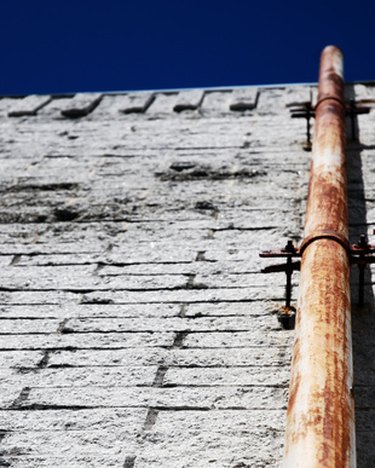Things You'll Need
Cloths or old clothes
Sandpaper or steel wool
Paintbrushes
Anti-corrosive primer
Grease and oil solvent
Mineral spirits
Iron metal-compatible rust preventing paint

Rust on iron occurs when the metal comes in contact with moisture and oxygen, a process called oxidation. This chemical reaction creates a new substance referred to as iron oxide. Rust can seriously damage metals, especially iron, which is one of the most vulnerable metals to rust. Preventative steps can be taken to protect important iron pipes from rust. Repeat the process regularly. Weather conditions, climate and location are factors that determine how often these preventative measures should be repeated, which range between once every year to once every decade.
Step 1
Wipe oily and greasy iron pipes thoroughly with the solvent and cloths.
Video of the Day
Step 2
Scrub off any flaky rusted areas on the iron pipes using sandpaper or steel wool. Sanding off excess rust primes the iron pipes.
Step 3
Apply mineral spirits on a disposable cloth and rub it over the pipe's entire surface, removing any leftover grime, dirt or grease along the way. Allow the iron surface of the pipes to thoroughly dry.
Step 4
Prepare the iron surface for painting by applying the anti-corrosive primer on the pipes. Apply one or more coats of this primer, or apply according to the manufacturer's instructions. For spray primers, step back about six to eight inches from the pipe to apply. Be sure the anti-corrosive primer is dried according to the product instructions.
Step 5
Apply a thick coat of rust preventing paint to the pipe's exterior.
Warning
Wear a mask and eye protection when working with primer and paint, as well as old clothes that can get dirty. Use work gloves to avoid hand injuries. Work in an open area for better ventilation.
Video of the Day